Related Research Articles

Girish Karnad was an Indian actor, film director, Kannada writer, playwright and a Jnanpith awardee, who predominantly worked in Kannada, Hindi, Tamil, Telugu, Malayalam and Marathi films. His rise as a playwright in the 1960s marked the coming of age of modern Indian playwriting in Kannada, just as Badal Sarkar did in Bengali, Vijay Tendulkar in Marathi, and Mohan Rakesh in Hindi. He was a recipient of the 1998 Jnanpith Award, the highest literary honour conferred in India.
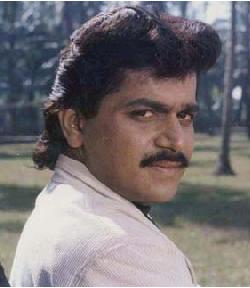
Laxmikant Berde was an Indian Marathi language film actor who appeared in Marathi and Hindi movies. Known for his highly energetic slapstick performances, Berde started his career as an employee in the production company Mumbai Marathi Sahitya Sangh and then played supporting roles in a few Marathi stage plays. In 1983–84, he first became famous with the Marathi play Tur Tur.

Sonal Sehgal is an Indian actress who debuted on the silver screen with the critically acclaimed Aashayein (film) directed by the national award-winning director Nagesh Kukunoor where she was cast opposite John Abraham. She went on to play lead roles in films like Future to bright hai ji (2012), Mantostaan (2017), and Lihaaf (2019).

Lillete Dubey is an Indian actress and theatre director. She has worked in Indian and international theatre, television and films in Hindi and English languages. Dubey began her career with Barry John in Delhi and was the founding member of his group - Theatre Action Group in 1973. In 1991 she set up her own theatre company - The Primetime Theatre Company.

Jayant Kaikini is a poet, short story writer, playwright, columnist in Kannada and a lyricist in Kannada cinema. He has so far published six anthologies of short stories, four books of poetry, three plays and a collection of essays. He is valued as one of the best writers in Kannada literature and has revolutionized the field by giving it a fresh new perspective. He has bagged many notable awards like 'Karnataka Sahitya Academy' award, Kusumagraj Award, Katha Award, DSC Prize for South Asian Literature amidst others. Kaikini is regarded as one of the most significant writers in Kannada today. Kaikini has been conferred the honorary doctorate from Tumkur University.
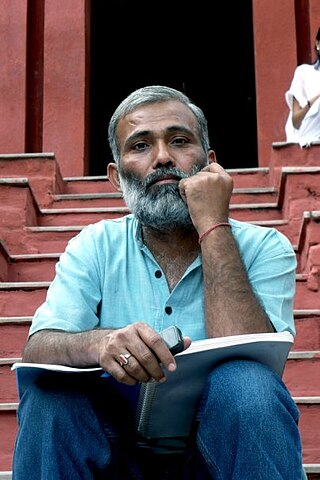
Arvind Gaur is an Indian theatre director, actor trainer, social activist, street theatre worker and story teller. He is known for socially and politically relevant plays in India. Gaur's plays are contemporary and thought-provoking, connecting intimate personal spheres of existence to larger social political issues. His work deals with Internet censorship, communalism, caste issues, feudalism, domestic violence, crimes of state, politics of power, violence, injustice, social discrimination, marginalisation, and racism. Arvind is the founder of Asmita, which is a theatre group in Delhi.
Rashi Bunny is an Indian theatre and cinema actress. She has performed in Bhisham Sahni's Madhavi, Manjula Padmanabhan's Hidden Fires, and Antoine de Saint-Exupéry's The Little Prince with director Arvind Gaur. Rashi Bunny was selected as "one of the 50 Icons: Emerging personality of India" by the Sahara India group with Rahul Gandhi. Rashi Bunny is also known for the "I have a dream" theatre workshop for self-exploration and creative expression.

Manu Rishi Chadha is an Indian actor, lyricist, script and dialogue writer who works in Hindi films. Rishi is trained under theatre director Arvind Gaur for six years. He won the Filmfare Best Dialogue Award in 2009 for Oye Lucky! Lucky Oye! He also won the IIFA Best Dialogue Award for Oye Lucky! Lucky Oye!.
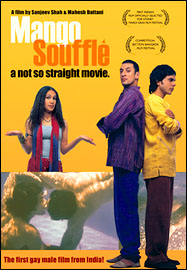
Mango Soufflé is a 2002 Indian English language film written and directed by Mahesh Dattani. The film stars Atul Kulnani and Rinkie Khanna. It was promoted as "first gay male film from India" and was adapted from Dattani's own English play On a Muggy Night in Mumbai. The film was shot in Bangalore.
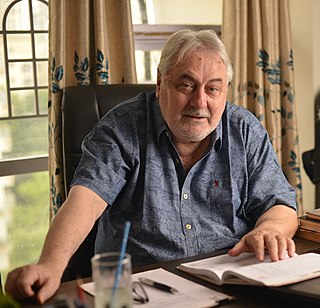
Barry John is an English-born Indian theatre director, actor, and acting coach.

Ram Dayal Munda, known as R. D. Munda, was an Indian scholar and regional music exponent. He was awarded the Padma Shri of the year 2010 for his contribution to the field of art.
Pamela Rooks was an Indian film director and screenwriter, most known for the film, Train to Pakistan (1998) set in Partition of India and based on Khushwant Singh's novel; it was screened at several international film festivals. Apart from that accomplishment she also made award-winning films like, Miss Beatty's Children (1992) and Dance Like a Man (2004) and several documentaries.

Damodar Mauzo is an Indian short story writer, novelist, critic and script writer in Konkani. He was awarded the 57th Jnanpith Award, India's highest literary honour, in 2022, Sahitya Akademi Award in 1983 for his novel Karmelin and the Vimala V. Pai Vishwa Konkani Sahitya Puraskar award for his novel Tsunami Simon in 2011. His collection of Short stories Teresa's Man and Other Stories from Goa was nominated for the Frank O'Connor International award in 2015. He has served as a member of the executive board, general council, as well as the finance committee of the Sahitya Akademi.
Adya Rangacharya, known as R.V. Jagirdar till 1948, later popularly known by his pen name Sriranga, was an Indian Kannada writer, actor and scholar, and a member of the Adya Jahagirdar family. He was awarded the Sangeet Natak Akademi Fellowship in 1967 and the Sahitya Akademi Award for literature in 1971 for Kalidasa, a literary criticism in Kannada.
Shekinah Jacob is an Indian playwright who has appeared in Edinburgh Fringe and worked with the Royal Court Theatre.

Denzil Leonard Smith is an Indian film and stage actor and producer. Born to Anglo-Indian parents in Mumbai, he is known for his stage and screen roles as a character actor. Smith has acted in over 50 plays and 60 films.

Ivan Rodrigues, whose native place is Karnataka, India, is a film and theatre actor based in Mumbai, India.
Hasmukh Saab ki Wasihat is a 2015 Indian Hindi-language film directed by Mahesh Dattani. It stars Mohan Agashe in the lead role along with Achint Kaur, and Seema Pahwa.
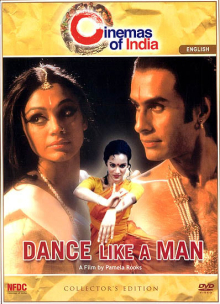
Dance Like a Man is a 2004 Indian English-language dance drama film directed by Pamela Rooks based on the play of the same name by Mahesh Dattani. The film stars Shobana, Arif Zakaria and Anoushka Shankar in her acting debut. The film won the National Film Award for Best Feature Film in English.
References
- ↑ Deepa Punjani. "In Retrospect: Select plays of the 9th National Theatre Festival at Nehru Centre, Mumbai". mumbaitheatreguide.com. Archived from the original on 1 March 2009. Retrieved 2 April 2009.
- ↑ Romesh Chander (30 March 2007). "Lifting the veil". The Hindu . Chennai, India. Archived from the original on 7 November 2012. Retrieved 2 April 2009.
- ↑ "Stage On & Off". The Telegraph. Calcutta, India. 19 November 2005. Archived from the original on 24 September 2006.
- ↑ PTI (29 December 1998). "Sahitya Academy awards announced". The Indian Express . Retrieved 2 April 2009.[ permanent dead link ]
- ↑ "30 years on, Tara's messages on gender discrimination, disability still resonate".
- ↑ Rajan, Anjana (18 June 2014). "Paradox at play". The Hindu .
- ↑ "Drama is about character revelation". The Thumb Print. 1 November 2012.
- ↑ "Mahesh Dattani". www.mapsofindia.com. Retrieved 9 May 2016.
- 1 2 De, Aditi (14 July 2001). "The Drama in Mahesh Dattani's Life". Man's World . Retrieved 13 April 2020.
- ↑ "The Sunday Tribune - Spectrum - Article".
- ↑ Madur (10 October 2011). "Mahesh Dattani" . Retrieved 13 April 2020.
- ↑ Bhawana Somaaya (22 November 2004). "Story teller". ScreenIndia. Retrieved 2 April 2009.
- ↑ Drama critics. "Mahesh Dattani's Final Solutions". Archived from the original on 18 March 2009. Retrieved 2 April 2009.
- ↑ Dattani, Mahesh (15 July 2013). Seven Steps around the Fire: A Radio Play. Penguin UK. ISBN 9789351182153.
- ↑ Saraswat, Surbhi. "Writing Wrongs: Mahesh Dattani's Thirty Days in September as a Trauma Narrative." Turkish Online Journal of Qualitative Inquiry 12.3 (2021).
- ↑ Saraswat, S., “Urban Materiality and Social Change: Mapping the Urban Reality in Mahesh Dattani's the Big Fat City”, ECS Transactions, vol. 107, no. 1, pp. 13701–13708, 2022.
- ↑ Diwan Singh Bajali (20 February 2003). "Going bananas over Mango Souffle". The Hindu. Archived from the original on 31 July 2004. Retrieved 2 April 2009.
{{cite web}}: CS1 maint: unfit URL (link)
9. G Baskaran, ed., Girish Karnad and Mahesh Dattani: Methods and Motives, Yking Books, Jaipur, 2012.